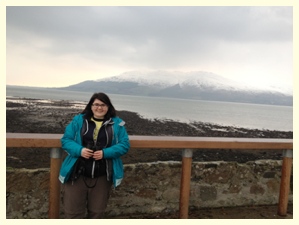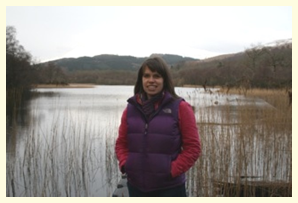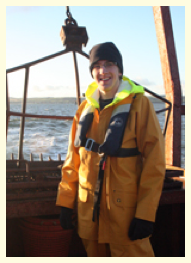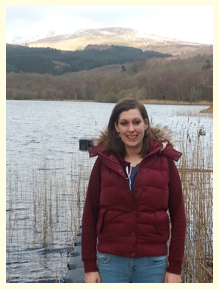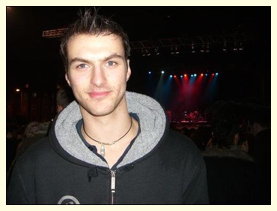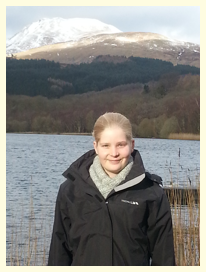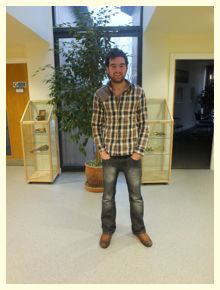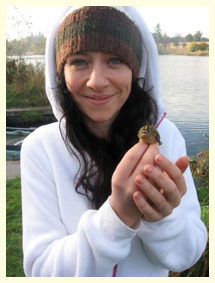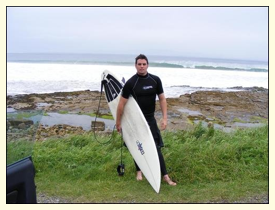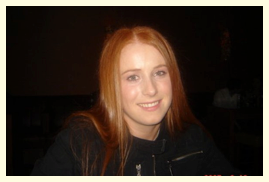| 21 |
Meet the new IBIS Masters researchers |
| Aoibheann Canavan - Masters at Queen's University Belfast |
|||||
| Elizabeth Clements - Masters at University of Glasgow |
|||||
I have had a number of roles within Environment Agency, but most recently I was working as Technical Specialist in fisheries and biodiversity managing river restoration projects from small scale reach improvements to larger catchment scale plans, and fish and eel passage work on large engineered flood defence structures. In the past I have also worked for the charity RAFTS, the umbrella organisation representing rivers and fisheries trusts across Scotland. This role as Project Co-ordinator involved writing and implementing a strategy to address barriers to fish migration across Scotland, accessing fund from the SEPA WFD restoration fund and work on invasive non-native species. Having worked for a number of years in regulatory roles I felt it was time for me to get back to doing the science that influences the decision making in these organisations and an MRes appeared to be the perfect way to do that. My MRes will be looking at Freshwater Pearl Mussel conservation, in an attempt to gain a better understanding of the life history strategy and threats to increasingly vulnerable populations. My research should inform future management to ensure the populations in perpetuity. |
|||||||
| Lawrence Eagling - Masters at Queen's University Belfast |
|||||
What were you doing before the IBIS MPhil? MSci in Marine Biology at the University of Southampton, where my dissertation was investigating the reproduction of the Ostrea edulis fishery in Chichester Harbour. What is your topic of research? The management practice of Ostrea edulis in Loch Ryan. Why do you find it interesting? I like research which has an actual impact in the field as this project is useful for the fisherman and management company as well as for research. We know you as a Scientist but you may have been a…? A photographer or computer programmer More info |
|||||||
| Jessica Fordyce - Masters at University of Glasgow |
|||||
During my final year, I completed an honours project looking at the distribution and rate of spread of the invasive macroalgae, Sargassum muticum on the west coast of Scotland. I then spent 6 weeks during the summer on a University Expedition in the Ecuadorian Amazon rainforest. There I took part in research describing population estimates of frogs and toads. Following this, I worked for the department of Rural Payments and Inspections Directorate where I carried out soil sampling for potato cyst nematode. For my masters, I am going to assess the population structure of sea trout stocks within the Foyle catchment, to further understand the characteristics and habitats which promote sea trout. Furthermore, by genetic analysis and phenotypic patterning, I hope to be able to analyse the population structure of brown trout within the Foyle catchment. |
|||||||
| Simon Guist - Masters at Queen's University Belfast |
|||||
What did you do before you came to work on the IBIS project? Studied Biological Sciences at Queens University until 2010. Then I worked as a Scientific Officer for the Loughs Agency and as a tennis coach throughout Northern Ireland. What is the topic of your research? Developing best practices for C.gigas producers. We know you as a Scientist but you may have been a...? Hmm… who knows. Probably working in a sports related job. You wish people would take more notice of… The marine environment, before irreversible damage is done. In a nutshell, my philosophy is this: Carpe Diem…..seize the day. What’s your favourite method / protocol / technique / equipment in the lab or field? Electrofishing. It is amazing to see how many species of fish you can find in a seemingly lifeless river! More info |
|||||||
| Hannele Honkanen - Masters at University of Glasgow |
|||||
During my time at university I was involved with the Zoological Society (as vice president) and the Exploration Society's Ecuador expedition to San Jose de Payamino in Ecuadorian Amazon - in 2011 as a team member and in 2012 as the team leader. In Ecuador I took part in several projects with a common aim of building species lists for the area: canopy access, mammal camera trapping and amphibian and butterfly transects. Between finishing my Bachelors and starting Masters, I spent 5 months in Finland during which I worked as a teaching assistant in a primary school and also as a substitute teacher for three schools. My research interests are fairly broad, but my main interests at the moment are population dynamics and behavioural ecology of marine and freshwater fishes. My Masters project’s title is 'Modelling the early life stages of salmon to improve conservation limit estimations'. Conservation limit (CL) represents the point below which a stock level should not fall and is commonly used in salmon management to control fishing effort. CL is based on a modelled estimate of the stock size. The model includes a habitat parameter – grading of 1-4 according to its suitability to salmonids and an egg deposition target for each grade. My project aims to improve this model by adding accuracy into the habitat parameter. I will be collecting detailed habitat data and want to study the carrying capacity and productivity of rivers by identifying microhabitats suitable for the different early life stages of Atlantic salmon. The project methodology has not been fully outlined yet but habitat surveys will form majority of fieldwork." |
|||||||
| Martin Hughes - Masters at University of Glasgow |
|||||
In my research I am primarily interested in the phenotypic plasticity of marine and freshwater fish. In essence the process of natural selection is the ability of an organism to adapt to certain environments. Some species can display highly variable plastic responses when exposed to different environmental conditions. Freshwater fish, which are more limited in movement than their marine counterparts, can be exposed to an array of local environmental conditions which may result in significant changes in morphology, physiology and behaviour among populations of the same species. Such populations may begin to show genetic distinction as they specialise in an isolated environment. The exceptional rate of climate change and relentless modification of environments as humans encroach ever more into the natural world may result in the loss of these genetically diverse populations or produce more extreme phenotypic responses. Understanding the differences among populations is critical to minimise the loss of diversity within a species. In my future work I am looking at Ferox trout, which are classically described as large, predatory, piscivorous brown trout, known to feed on other brown trout but show a preference to Arctic Charr Salvelinus alpinus. Although most fisheries biologists consider ferox as part of the brown trout species complex that have adopted a life-history strategy of delayed maturation, extended maturation, extended longevity, piscivory and rapid growth some ferox have been shown to be genetically distinct in lakes in Scotland & Ireland. I would like to enhance our understanding of ferox by: • Comparing the morphology of ferox trout and sympatric brown trout. • Radio- tagging ferox to gain a greater understanding about their behaviour in the wild. • Examine the possible conditions that trigger a brown trout to ferox trout switch by manipulating conditions in a laboratory environment. • Investigate the possibility of a ferox trout hatchery. |
|||||||
| Julie Miller - Masters at University of Glasgow |
|||||
Unlike the majority of the Glasgow Masters students, My degree involves 2 short projects rather than 1 large project over the course of the year: I have opted for 2 rather different but equally interesting projects. My first project examines the basis for setting conservation limits for the Atlantic salmon in the Foyle catchment region. I intend to present a review of the current model and figures and then explore further the assumptions of the model and in particular the designation of nursery habitat grading based on the current criteria. I am working in liaison with Loch Lomond Fisheries Trust to examine habitat data with a view to presenting some rigorous testing of the assumed differentiation between habitat scores. My second project intends to look at variability in seabird populations. Data on changes in population abundance show spatial variation across Ireland and west Scotland. In this project I will combine long-term population dynamics with data on behaviour of seabirds within the context of the intertidal habitat in general and aquaculture within this habitat. Behaviour might be able to give a more immediate insight into environmental changes than long-term data on population dynamics. I will collect behavioural data at sites with known long-term population dynamics. Further to this I would propose to also collect data on the occurrence of persistence of e-coli resistant bacteria (non-invasive procedure) in selected bird species and analyse any occurrence found with other data collected (i.e. foraging locations/aquaculture/diet/stable isotopes). |
|||||||
| Luke Murphy - Masters at Queen's University Belfast |
|||||
What is your topic of research? I am an MPhil student studying the effects of aquaculture on intertidal birds on Lough Foyle. Why do you find it interesting? This project will be enjoyable as it is allowing me to diversify into new study areas and will also expand my field work skills. We know you as a Scientist but you may have been a…? In my spare time I enjoy surfing and fishing. In fact, am a bit obsessed by both; spending nearly every spare second and penny on them. More info |
|||||||
| Sinead O'Reilly - Masters at University of Glasgow |
|||||
I joined Inland Fisheries Ireland in 2006 on a summer bursary and worked there for following summers in 2007 & 2008 working on Fish stock populations in the Grand and Royal canal. After my degree I worked as a demonstrator with undergraduate students of the School of Biology and Environmental Science in UCD in 2009- 2010. I was then employed with Inland Fisheries Ireland in 2011 and 2012, working with the Water Framework Directive project on rivers, lakes and transitional waters. I then worked with the Habitats Directive on carrying out surveys on shads, lampreys, smelt, char, pollan and Atlantic salmon. I have also worked on the eel monitoring programme and in general research, archiving fish data dating back over one hundred years. I have a great interest in fisheries ecology and especially fish and I am a keen angler. I know invasive species are having a huge impact on our native species and this is causing a big problem to our freshwater systems. For my Ms(Res) I aim to carry out a study on the toxicity of biocides used to help eradication of the North American Signal crayfish Pacifastacus leniusculus in a controlled laboratory experiment with the hope of using another invasive species not yet in Scotland such as the Asian Clam Corbicula fluminea. There have been a small number of experiments carried out in Scotland in small ponds using one biocide known as “Pyblast”. However this biocide is very expensive and the experiments were not successful in total eradication due to its delivery. I will be using a number of biocides in a lab experiment on Signal crayfish to get an exact concentration required from each biocide to reach total mortality. Upon delivery to the water, the chemical in previous experiments degraded rapidly on the surface thus losing it concentration as it sank to the bottom leaving some crayfish unharmed. Out in field I plan to use the best biocide and increase its density so it quickly reaches the bottom of the pond reaching all crayfish before starting to degrade. If this experiment works, I may look into the effect these biocides have on the invasive Killer shrimp and Asian clam. |
|||||||
IBIS newsletter March 2013 |
||||||

